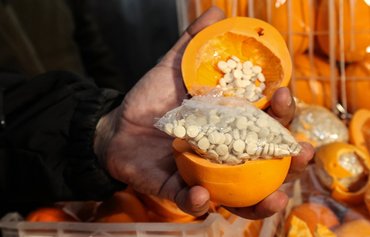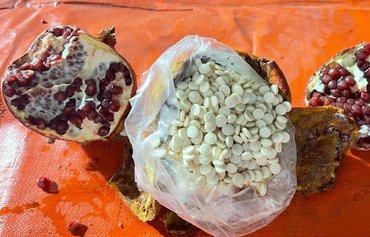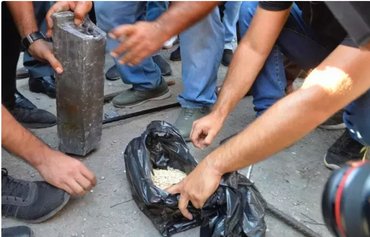BEKAA VALLEY, Lebanon -- A decade of civil war has left Syria fragmented and in ruins but one thing crosses every front line: a drug called Captagon.
The stimulant, once notorious for its association with "Islamic State of Iraq and Syria" (ISIS) fighters, has spawned an illegal $10 billion industry that props up the regime of Bashar al-Assad and has turned Syria into a narco state.
It also has sunk deep roots in Lebanon as that country's economy has collapsed.
Captagon is now by far Syria's biggest export, dwarfing all its legal exports put together, according to estimates drawn from official data.
![A Captagon dealer masks his face before sitting for an interview in the northern Syrian city of Aleppo on April 26. [AFP]](/cnmi_am/images/2022/11/11/38464-syria-captagon-dealer-600_384.jpg)
A Captagon dealer masks his face before sitting for an interview in the northern Syrian city of Aleppo on April 26. [AFP]
![Seized drugs, including Captagon, are displayed in the town of Marea, in northern rural Aleppo province, on May 24, following clashes among different factions in Syria. [AFP]](/cnmi_am/images/2022/11/11/38465-syria-captagon-pills-600_384.jpg)
Seized drugs, including Captagon, are displayed in the town of Marea, in northern rural Aleppo province, on May 24, following clashes among different factions in Syria. [AFP]
In a bid to grasp the scope of the phenomenon, AFP interviewed smugglers, a fixer who puts together multi-million dollar deals, 30 serving and former law enforcement officers from Syria and beyond, diplomats and drug experts.
Given the danger of speaking publicly -- particularly for those inside the trade -- the majority asked for their identities to be protected.
Border barons and tribal networks
Hidden behind dark glasses and a mask in a Bekaa Valley vineyard, a Lebanese fixer and trafficker revealed how he organised the shipments.
"Four or five big names typically partner up and split the cost of a shipment of say $10 million to cover raw material, transport and bribes," he said.
"The cost is low and the profits high," he said, adding that even if only one shipment out of 10 gets through, "you are still a winner".
"There's a group of more than 50 barons ... They are one big web, Syrians, Lebanese and Saudis," he said.
The retail price of a Captagon pill varies wildly, from $25 for the premium tablets to $1 for low quality adulterated pills. Many are manufactured in the lawless badlands between Syria and Lebanon.
Many key players have tribal ties, particularly through the Bani Khaled, a confederation that reaches from Syria and Lebanon to Jordan, Iraq and Saudi Arabia.
A shipment can stay within the Bani Khaled's sphere of influence the whole way from manufacture in Syria to delivery in Saudi Arabia, said multiple sources, including a smuggler, an intelligence officer and Syrian army deserters.
The economics of the trade are dizzying.
More than 400 million pills were seized in the Middle East and beyond in 2021, according to official figures, with seizures this year set to top that.
Customs and anti-narcotics officials revealed that for every shipment they seize, another nine make it through.
That means even with a low average price of $5 per tablet, and only four out of five shipments getting through, Captagon is at least a $10 billion industry.
With Syria the source of 80% of the world's supply, according to security services, the trade is at least worth three times its entire national budget.
Al-Assad's brother
The Syrian state is at the heart of the trade in regime-controlled areas, narcotics analysts say.
The shadowy network of warlords and profiteers to whom al-Assad is indebted has benefited hugely from it, including Lebanese Hizbullah, which analysts say plays a significant role in protecting the trade along the Lebanese border.
"Syria is in dire need of foreign currency, and this industry is capable of filling the treasury through a shadow economy from importing raw materials to manufacturing and finally exporting" the pills, said an ex-Syrian government adviser now outside the country.
A dozen sources said the Syrian regime's 4th Division, headed by al-Assad's brother, Maher, was deeply involved in the trade.
These sources included smugglers, a regional law and order official, a former Syrian intelligence officer, a member of a tribe that smuggles Captagon and a pharmaceutical industry insider, among others.
"Maher al-Assad is one of the main beneficiaries of the Captagon trade," said Syrian Observatory for Human Rights director Rami Abdel Rahman.
"He receives his own share from the profit. Drug money has become a main source to pay the salaries of an armed group affiliated with the 4th Division," he added.
Some Captagon labs get "the raw material directly from the 4th Division, sometimes in military bags", said a Syria monitor, with a trafficker revealing that it even supplied opposition groups with the drug.
The 4th Division controls large parts of the porous border with Lebanon that is key to the trade, with the Mediterranean port of Latakia another of its bastions.
Caroline Rose, of the Washington-based Newlines Institute, said the 4th Division has "played an active role in guarding, facilitating and running a lot of Captagon in Homs and Latakia" and then "transporting shipments to state-owned ports".
The Lebanese frontier, which has never been clearly demarcated, has long been exploited by smugglers, with Captagon operations now booming in the north.
"Wadi Khaled is the new hub, the place is full of traffickers," a judicial source said, referring to a remote northern border region where much of the population on the Lebanese side identifies as Syrian.
At the height of the war, arms were smuggled into Syria through Wadi Khaled.
Now Captagon flows in the other direction.
Candy-making machine
Beyond the chemicals, the biggest investment for a Captagon lab is a tablet press or candy-making machine.
One Chinese website even advertises a "Captagon tablet press" for $2,500 that can spew out tens of thousands of pills an hour.
Some of the pills are stamped with Captagon's trademark logo -- two C's -- that have earned it the nickname "Abu al-hilalain" (two crescent moons).
Once the chemical precursors have been procured, it takes only 48 hours to set up a Captagon manufacturing laboratory with relatively rudimentary equipment.
This means that even when drug units swoop, the Captagon cooks can quickly start working again. They have even been known to set up mobile labs in the back of utility vans, especially after a recent clampdown in eastern Lebanon.
The Syrian government also acts, but most seizures "are nothing but pure farce ... the enforcers are themselves the thieves", said a Syrian pharmaceutical company worker interviewed outside the country.
Some pharma plants are also involved in the trade, he added.
'Captagon king'
"Captagon king" Hassan Dekko used to run his empire out of the Lebanese border village of al-Tufail, which sits at the tip of a tongue of land jutting into Syria north of Damascus.
But Dekko, a binational with high-level political connections in both countries, was arrested in April last year after major Captagon seizures.
In court documents, Dekko denied any involvement in drug trafficking.
But anti-narcotics chiefs in Lebanon claim that some of the businesses he owns, including a pesticide factory in Jordan, a car dealership in Syria and a fleet of tanker trucks, are common covers for drug barons.
Several security sources as well as deserters from the Syrian army described Syrian MP Amer Khiti, who is under US sanctions, as another major figure in the business.
"Khiti is involved in smuggling Captagon," the Syrian Observatory for Human Rights confirmed.
He also has been named in reports from the Centre for Historical Analysis and Conflict Research and the Centre for Operations Analysis and Research (COAR).
'Few good options'
From the Syrian regime officials and millionaire businessmen at the top of the chain down to the villagers and refugees employed to cook and conceal the drugs, Captagon dollars get spread far and wide in Syria and Lebanon.
With no end in sight to their economic and political crises, the fear is that Captagon will become an even bigger pillar of life in both countries, where up to a fifth of the pills are produced.
According to multiple sources, the Captagon barons have built strong political connections there.
"Syria became the global epicentre of Captagon production by conscious choice," said Ian Larson, chief Syria analyst at COAR, who has written extensively on the drug.
With its economy crippled by war and sanctions, "Damascus had few good options", he said.

![A masked Captagon dealer sits for an interview in the northern Syrian city of Aleppo on April 26. [AFP]](/cnmi_am/images/2022/11/11/38463-Masked-Captagon-dealer-600_384.jpg)






